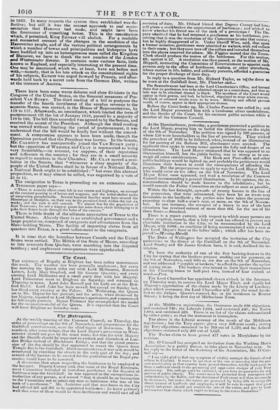Chc ffietrapolis.
At the weekly meeting of the Common Council, on Thursday, the order of proceediegs on the 9th of November, and preparations for the Guildhall entertainment, were the chief topics of discussion. It was resolved, niter some debate, that the Lord Mayor's procession to West- minster should not pass by the usual route, but that his civic Majesty and the Sheriffs should be requested to embark and disembark at Lon- don Bridge instead of Bluektriars Bridge ; and that the grand proces- sion of the day should be that appointed to escort the Queen front Temple Bar to the Guildhall. Much inconvenience, it was said, would be occasioned by crowding the streets in the early part of the flay; and several of the barriers to be erected for the protection of the Royal pro- cession would have to be removed.
A discussion then arose respecting the bottlemen to be employed at the banquet. Deputy Conley said, that some of the Royal Entertain- ment Committee intended to introduce gentlemen in the disguise of botticins it into the Guildhall : be was opposed to the surreptitious in- troduction of any person, and moved "that it should be an instruction to the Committee not to admit any man as bottleman who was of the -rank of a gentleman." Mr. Anderton said thut merchants in the City tad offered 201. and SOL to be appointed bottlemen : he knew perfectly Atli that sortie of them would be Area. buttlemen and would east Wall restraint of duty. Mr. Obbard hinted that Deputy Corney had hirn.. self given a stockbroker the appointment of bottleanan ; and wished to know whether his friend was of the rank of a gentleman ? The De- puty admitted that he bad returned a gentleman as his bottleman, per- ceiving that it was the resolution of the Committee to take that course; but he highly disapproved of it. Under Sheriff Wire, said, that upon a former occasion, gentlemen were admitted as waiters, with red collars to their coats ; but they soon tote off the collars and intruded themselves into the 13lacea reserved for others. Mr. Figgins moved that the Town- Clerk should produce the names of the bottlemen. For this motion, 43; against it 57. A resolution was then passed, as the motion of Mr. Heppell, instructing the Committee of Entertainment to appoint such persons only to the office of bottlemen, waiters, or other attendants, whose station in life, habits, and ordinary pursuits, afforded a guarantee for the proper discharge of their duty.
In reply to a question from Mr. Richard Taylor, as to the dress to be worn at the Guildhall feast, Mr. Fletcher said— The Remembrancer had been at the Lord Chamberlain's Office, and learned there that no gentleman was tote admitted except in a court-dress, and that no lady was to he admitted dressed in black. The members of the Court would appear in their gowns, and had, he believed, stipulated to wear white cravats. No black or coloured stocks were to be worn. Military and official persons would, of course, appear in their appropriate dresses.
Before the Court broke up, Mr. Charles Pearson was called in; and the Lord Mayor presented him with a handsome silver candelabrum, and the thanks of the Court, for his eminent public services while a member of the Common Council.


























 Previous page
Previous page